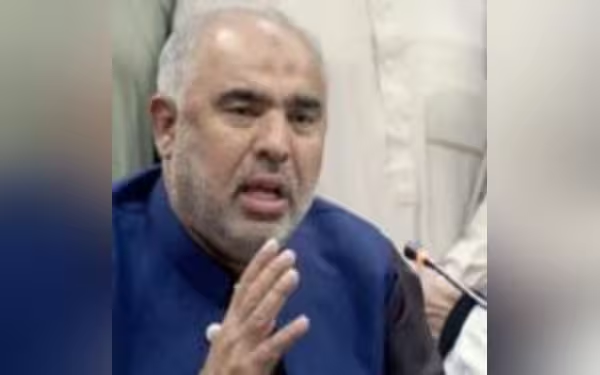Saturday, November 16, 2024 05:47 PM
Asad Qaiser Predicts Imminent Release of Imran Khan
- Asad Qaiser expresses optimism for Imran Khan's release.
- PTI plans to file FIR against police obstruction.
- Qaiser challenges PML-N leadership to fair elections.
 Image Credits: pakistantoday
Image Credits: pakistantodayAsad Qaiser asserts Imran Khan's release is imminent, criticizing the government and announcing PTI's plans for protests and legal action.
In a significant development within Pakistan's political landscape, Asad Qaiser, a senior leader of the Pakistan Tehreek-e-Insaf (PTI), has expressed strong optimism regarding the imminent release of the party's founder, Imran Khan. This statement comes amidst ongoing tensions between the PTI and the current government, which Qaiser has criticized as being unrepresentative of the people's will.
During a recent appearance on a private television channel, Qaiser articulated his belief that Imran Khan cannot remain incarcerated for an extended period, despite existing court orders. He described the current government as a "product of Form 47," implying that it lacks legitimacy and operates contrary to the desires of the populace. This sentiment reflects a growing frustration among PTI supporters regarding the treatment of their leader.
Qaiser, who was part of a PTI delegation that sought to meet Khan in jail, revealed that they had received permission from the Islamabad High Court to do so. However, their efforts were thwarted by police resistance, which he characterized as abusive and misleading. "We were abused, pushed, and not allowed to meet Imran Khan," he stated, emphasizing that their actions were in compliance with the court's directive and did not violate any laws.
In his remarks, Qaiser did not shy away from criticizing senior government officials, particularly Prime Minister Shehbaz Sharif and Maryam Nawaz, whom he accused of treating the country as their personal property. He raised questions about the qualifications of the Islamabad Inspector General of Police, referring to him as a "doctor" while expressing skepticism about the legitimacy of his credentials. This pointed criticism underscores the PTI's broader narrative of accountability and governance.
In response to the police's obstruction, Qaiser announced that PTI would file a First Information Report (FIR) against the Inspector General of Police and other officials involved. He also pledged to bring these matters before the Parliament’s Human Rights Committee, advocating for governance based on law rather than the whims of a select few. "The government is a product of Form 47 and will follow any order it receives. The country is being run by a few people according to their will," he remarked, highlighting the need for equitable treatment of all citizens.
Addressing the political standing of PTI, Qaiser asserted that despite the alleged theft of their electoral mandate, PTI remains the largest political party in both the National Assembly and Punjab. "PTI is the largest party in both the National and Provincial Assemblies. Our workers are with us; they understand our leadership," he stated, reinforcing the party's commitment to challenging the status quo.
Looking ahead, Qaiser announced plans for ongoing protests, both on the streets and in the courts, within the constitutional framework. He emphasized, "No party has struggled for three years as PTI has. Our protests will continue. We will face cases in courts, but we will not back down." This determination reflects the party's resilience and commitment to its cause.
In a direct challenge to the leadership of the Pakistan Muslim League-Nawaz (PML-N), Qaiser dared Nawaz and Shehbaz Sharif, along with Interior Minister Rana Sanaullah, to contest elections in any constituency, promising that PTI would field ordinary workers as candidates. However, he insisted that a "level playing field" and transparent elections are essential for any electoral contest. "If we don’t win under these conditions, we will leave politics," he declared, showcasing the party's readiness to engage in fair competition.
Concluding his remarks, Qaiser reiterated his belief in the imminent release of Imran Khan, stating, "He cannot be kept in jail for long. We hope to see him free soon." This statement encapsulates the PTI's ongoing struggle for justice and the restoration of its leadership, reflecting a broader narrative of political resilience in Pakistan.













